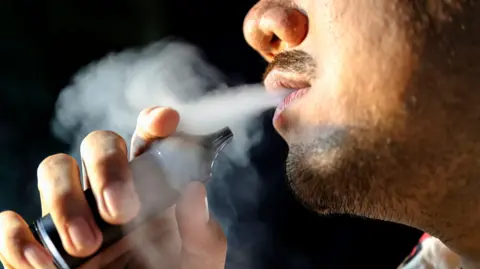Singaporean authorities have announced tougher penalties for vaping as they try to crack down on the increasing use of drug-laced vapes in the country.
These include stiffer fines, longer jail terms, and even caning. Foreigners may also be deported.
While Singapore was one of the first places in the world to ban vaping in 2018, the practice has persisted, and in recent months the city-state has seen a rise in popularity of vapes laced with etomidate, an anaesthetic drug.
This has caused widespread alarm in the country which has some of the world's toughest drug laws.
In recent months, authorities have acknowledged the growing prevalence of etomidate-laced vapes, more popularly known as Kpods in Singapore. The nickname is short for 'ketamine pods' and refers to how etomidate has similar effects to ketamine.
A test of a random sample of 100 seized vapes in July found that a third contained etomidate.
Videos of teenagers and young adults acting erratically in public while vaping have also gone viral on social media, sparking concern among Singaporeans who widely support the country's tough penalties on drug trafficking and use.
Health Minister Ong Ye Kung stated that the tougher laws were necessary as 'vapes have become a gateway for very serious substance abuse,' with the devices acting as 'delivery devices' for drugs.
The government has sharpened penalties for vaping while reclassifying etomidate as a Class C controlled drug for six months. The new rules will come into effect on September 1.
Those caught using or possessing vapes – even regular ones – will face increased fines starting from S$500 (£288; $390) and state-mandated rehabilitation. The penalties will be even harsher for those caught with etomidate-laced vapes.
Suppliers of drug-laced vapes will face up to 20 years in jail and 15 strokes of the cane.
Foreigners working in Singapore will face the same penalties, risk having their residential and employment permits revoked, and may be deported and banned from re-entering the country.
The rules also apply to tourists. The BBC understands that signs will be placed throughout Changi Airport reminding visitors of the vaping ban, along with vape disposal bins so that users can dispose of their devices without facing penalties.
The rules are intended as an interim measure while the government formulates new laws to deal with etomidate and any other drugs that could be delivered through vapes.
These measures accompany a significant public health campaign and enforcement programme, including government advertisements urging people to stop vaping, the establishment of vape disposal bins, and an anti-vaping education initiative in schools.
Authorities have also launched roving patrols of trains, bus terminals, and parks, conducting checks on members of the public. Given that many vapes in Singapore originate from neighboring countries like Malaysia and Indonesia, checks at land crossings and airports have been intensified.
Singapore's crackdown comes as other countries have implemented stricter rules to curb youth vaping.
In June, the UK banned the sale of disposable vapes after Belgium imposed a similar ban in January, while Australia has banned non-prescription and disposable vapes since 2023.


















